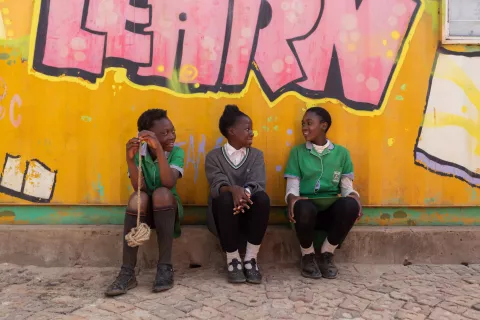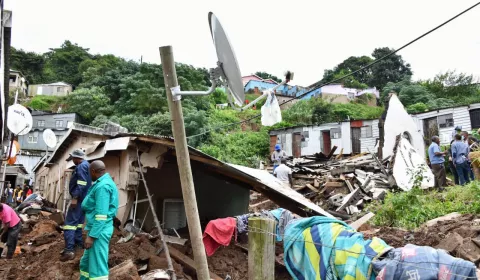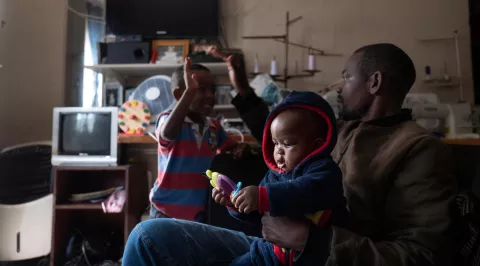UNICEF South Africa response to the Committee on the Rights of the Child concluding observations on South Africa’s child rights report
PRETORIA, 09 February 2024 – UNICEF congratulates South Africa for the progress made in advancing child rights, as reflected by the Committee on the Rights of the Child’s (CRC) concluding observations following the submission of South Africa’s latest periodic child rights report.
South Africa continues to lead by example through its commitment to the passing of institutional and policy measures related to the realization of child rights. The Committee noted as examples the Child Justice Amendment Act (2019), the Children’s Amendment Act (2022) and the National Child Care and Protection Policy (2019), among others. The adoption of the Policy for the provision of quality education and support for children with severe intellectual disabilities is also a vital step forward in enabling every child to reach their full potential.
UNICEF welcomes the Committee’s recommendation that the government’s new Medium-Term Strategic Framework (MTSF) 2024-2029 needs to position children as a national priority. The National Plan of Action for Children 2024-2029 in-turn requires clear actions, targets, and indicators, linked to the MTSF and other sectoral plans, with defined responsibilities and sufficient human, technical and financial resources for implementation. UNICEF appreciates the principle of ensuring that children are prioritized in the macro medium term plans and is ready to provide technical support in this regard.
The concluding observations also reflect the importance of protecting the budget needs of children so that relevant sectors are not affected by inflation, budget cuts or adverse economic conditions. UNICEF advocates for the ringfencing of budgeting for children and stands ready to support an assessment of the budget needs of children, as recommended by the Committee.
The State party is recommended to re-establish the Office of the Rights of the Child in the Presidency as a permanent body, with a clear mandate and sufficient authority, including the necessary resources for its effective operation. This will contribute significantly to the advancement, coordination and monitoring of child rights implementation across the government system.
UNICEF recognizes and welcomes South Africa’s strong data collection capacities and is committed to providing technical inputs to gather more nuanced and disaggregated child specific data, such as through Multiple Indicator Cluster Surveys, as noted in the Committee’s observations.
Despite overall progress, UNICEF shares the Committee’s concerns over the high prevalence of all forms of violence against children, including online. UNICEF will continue its support to all partners in tackling the root causes through violence prevention work and in improving care and recovery for child survivors.
The Committee’s emphasis on the critical role of parents in the advancement of child rights and the support that parents need, across many of the observations, provides for critical reflection by government departments and civil society. The Committee’s observation to update the School Safety Framework and to allocate adequate resources to community-based services for orphans and vulnerable children align with UNICEF’s ongoing work alongside government counterparts. In addition, UNICEF welcomes and is engaging with partners on the recommendations to tackle child sexual exploitation and abuse online through training parents, teachers, and children about risks, while improving child-friendly channels for reporting.
The Committee noted the adoption of various policies for children with disabilities, while also expressing concerns about challenges to prevent the equal enjoyment of rights by children with disabilities. The Committee urged the country through a number of recommendations to ensure that children with disabilities as rights-holders receive attention, including through appropriate and accessible services, access to information, child protection, social grants, amongst others.
Providing inclusive and quality learning, from early childhood to the learning to earning transition, are UNICEF education priorities. The Committee’s observations to operationalize the ‘Education White Paper 6’ on inclusive education, to implement a national strategy to tackle numeracy and literacy and to allocate sufficient financial resources to expand access to early childhood education will further improve a child’s educational journey.
UNICEF also welcomes the recommendations on ensuring all girls and boys have access to confidential and child-friendly sexual and reproductive health information and services, including protecting the rights of pregnant teenagers and adolescent mothers. UNICEF continues to support programming to reduce HIV prevalence, particularly among adolescent girls, and to ensure HIV status of every child is known and treatment is accessible.
The adoption of the National Food and Nutrition Security Plan 2018-2023 and Strategy for the Prevention and Management of Obesity in South Africa 2023-2028 are also noted by the Committee. These require urgent and scaled-up implementation to reduce child hunger and the impact of adolescent obesity, which can lead to the onset of non-communicable diseases. UNICEF is committed to working with Government and partners to reduce all forms of malnutrition, while ensuring universal quality health care for children, including driving up routine childhood immunization coverage.
The meaningful participation of children in the design and implementation of policies and programmes to achieve the 17 Sustainable Development Goals gives agency and voice to children and adolescents. UNICEF welcomes this recommendation, which aligns with findings such as in the recently launched ‘Climate, Energy and Environment Landscape Analysis for Children’, which reiterates the need for child specific considerations in climate and environmental policies. UNICEF also supports, alongside partners, the direct engagement of adolescents and youth in contributing to SDG monitoring, such as through young ‘Citizen Scientists’.
On reporting to international and regional human rights mechanisms, UNICEF notes the recommendations to strengthen the Inter-Departmental Committee on Compliance. This includes consulting systematically with the South African Human Rights Commission and civil society. UNICEF fully supports the need to further strengthen the Human Rights Commission as an independent human rights body.
Finally, UNICEF also welcomes the Committee’s recommendation to develop a child-friendly version of the concluding observations, so they are accessible for all children. We look forward to working with the Government of South Africa and civil society organizations to meaningfully engage children through the production of such child-friendly content.
Media contacts
About UNICEF
UNICEF works in some of the world’s toughest places, to reach the world’s most disadvantaged children. Across more than 190 countries and territories, we work for every child, everywhere, to build a better world for everyone.
Follow UNICEF South Africa on Twitter, Facebook, Instagram, YouTube, LinkedIn and TikTok




